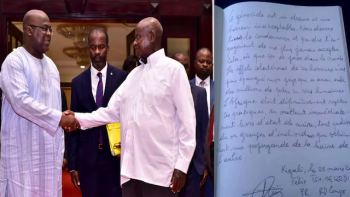“There is no such a thing as “good death”. Be it by genocide or war. Slaughtered in revenge killings. Perished in a accident or died from illness. The dead loved ones, wherever they are, are praying for us. There is no worst thing than death. Even though Genocide made me an orphan. But it cannot make me lose empathy for others. They also suffered from crimes, not qualified as genocide. Those brothers and sisters are, too, humans. I pray for them. Those brothers and sisters are, too, humans. I remember them.”
These are some of the lyrics that landed the Rwandan renowned gospel and soul musician Kizito Mihigo into jail in 2014. On February 17, 2020, The Rwandan Government sent out a press release, anouncing the death of Kizito Mihigo during his detention. The cause of death, according to Rwandan authorities, was suicide. However, independent observers, family members and social media alleged that Kiziti Mihigo was killed by Rwandan security operatives, during his interogation and torture. The graphic pictures of his body and wounds, appear to confirm the story of assassination and torture.
Photo: Kizito Mihigo detained, while trying to flee to Burundi in early Feb 2020.
Kizito Mihigo was condemned to 10 years on February 27, 2015. The sentence was reduced from 15 years, because he admitted the guilt and had asked for forgiveness. On Saturday Sep 15, 2018, along with Rwandan opposition leader Victoire Ingabire, star musician Kizito Mihigo and more than 2000 prisoners were released early from jail. On February 13, 2020, Kizito Mihigo was arrested trying to cross the border to Burundi.
In his last two songs before trying to flee to Uganda, Kizito Mihigo asked "my family, what did I do. Please respond. What wrong did I do to you? " and
"I want to join you, Lord. I want to be like you Lord, but I am powerless. I want to be with you. I want to do like you, but I can't. GIve the strength to do like you..."
Kizito Mihigo, formerly close to the regime of General Paul Kagame, was arrested after he published a song with the lyrics, later viewed as going against the narrative around the 1994 Rwandan inter-ethnic massacres (see our article here). In the song, Kizito Mihigo was inviting Rwandans to love each other and remember of the innocent people killed, whether they are Hutu or Tutsi.
After his arrest in April 2014, he admitted his guilt of plotting against General Paul Kagame and asked for forgiveness. However, his lawyers argued that the accusations against him lacked merit.
He was arrested along with Cassien Ntamuhanga, a catholic radio, Grace Radio, journalist, Jean Paul Dukuzumuremyi, a Rwandan Defense Forces (RDF) demobilized soldier, Agnes Niyibizi, accused of ferrying funds for terror operations, and several local leaders in Northwestern Rwanda. Unlike Kizito Mihigo, other co-accused consistently denied the charges.
Among the co-accused, Cassien Ntamuhanga was jailed for 25 years for terrorism and incitement, but cleared of plotting to assassinate President Kagame. He had continued to deny all charges. Jean Paul Dukuzumuremyi was condemned to 30 years of jail, whereas Agnes Niyibizi was acquitted.
Mihigo had admitted exchanging text messages with leaders of Rwandan National Congress (RNC), a South Africa-based Rwandan opposition group. He was cleared of terrorism.
Since the arrests and condemnation of Kizito Mihigo and his co-accused, a crackdown on people accused or suspected of being in what has come to be known in Rwanda as the “Kizito Mihigo’s conspiracy to overthrow General Kagame’s government”, was extended to the entire country.
Other suspected of involvement were allegedly summarily executed during a country wide crackdown that started in 2015, todate. The allegations of summary executions and assassinations were reinforced when several bodies, believed to come from Rwanda, showed up floating on rivers and lakes in the neighboring Burundi.
@AfroAmerica Network. All Rights Reserved.

















